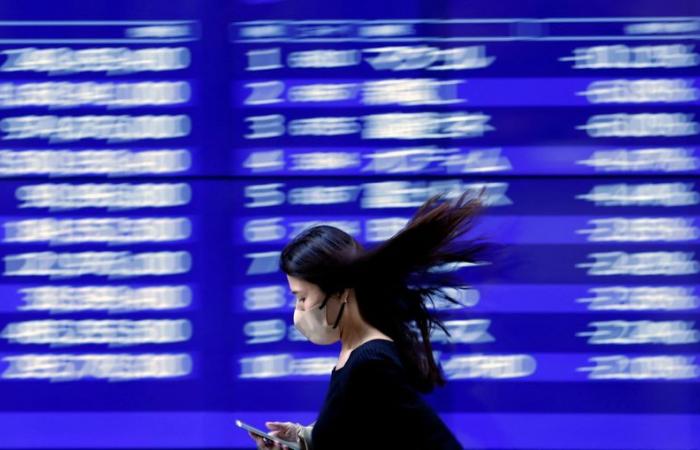Asian stocks stumbled on Wednesday, while currencies were volatile as traders struggled to weather the political storm in South Korea, where martial law was imposed and then lifted hours later.
The South Korean won strengthened in early trade, supported by the alleged intervention, but remained near its two-year low against the dollar, reached last Tuesday.
The benchmark KOSPI lost almost 2%, taking its year-to-date losses to more than 7%, making it Asia's worst-performing stock market this year.
MSCI's broadest index of Asia-Pacific stocks outside Japan, which counts Samsung Electronics among its main constituents, lost 0.32% on Wednesday.
South Korean President Yoon Suk Yeol said Wednesday he would lift the surprise declaration of martial law he imposed hours earlier, reversing a standoff with parliament that overwhelmingly rejected his attempt to ban the political activity.
“Martial law itself has been lifted, but this incident creates more uncertainty in the political landscape and the economy,” said Min Joo Kang, senior economist at ING.
“We are concerned that these events will impact South Korea's sovereign credit rating, although this is uncertain at this stage. However, this is a scenario that could occur.”
South Korea's finance ministry said it was ready to deploy “unlimited” liquidity in financial markets if needed. Yonhap News Agency said the financial regulator was ready to deploy 10 trillion won ($7.07 billion) into a stock market stabilization fund. The finance minister will hold a press conference at 0120 GMT.
“Korean authorities appear to be moving quickly and effectively. But Korean authorities appear to be moving quickly to stabilize markets, and the impact is expected to be short-lived,” said Charu Chanana, chief market strategist at Saxo.
However, the market shock in East Asia has renewed concerns about global uncertainties, with investors already reeling from political unrest in France that weighed on the euro, which was down 0 .11% to $1.04975.
French bond futures fell 0.13% while European stock futures were down 0.14% ahead of French lawmakers' vote Wednesday on no-confidence motions that are almost certain to end. oust the fragile coalition of Prime Minister Michel Barnier.
“If the government collapses, emergency legislation will likely be passed to avoid a government shutdown…the spread between French and German 10-year government bond yields may continue to move against the euro,” said Carol Kong, currency strategist at the Commonwealth Bank of Australia.
On the macroeconomic front, investors are hoping to get more clues to gauge what policy the Federal Reserve will likely adopt next year, with the highly anticipated November jobs report due Friday.
U.S. job openings rose significantly in October, while layoffs fell by the most in a year and a half, data showed Tuesday, suggesting the job market continued to strengthen. slow down in an orderly fashion, although another survey showed employers were reluctant to hire more workers.
Markets now estimate a 72% chance of a 25 basis point cut this month, with 80 basis points of cuts expected by the end of next year.
U.S. central bankers said they continued to believe inflation was moving closer to their 2% target and indicated they favored further rate cuts, but none spoke out. strongly for or against such a reduction at their next meeting to set rates in two weeks.
The spotlight now turns to Fed Chairman Jerome Powell, who will deliver what are expected to be his final public remarks before the meeting on Wednesday.
The dollar index, which measures the U.S. currency against six rivals, was up 0.12% at 106.45. The price of gold fell 0.17% to $2,639 due to a strong dollar. [FRX/] [GOL/]
Oil prices remained stable after gaining more than 2% in the previous session, as Israel threatened to attack the Lebanese state if the truce with Hezbollah collapses, and investors expected that OPEC+ announces extension of supply cuts this week. [O/R]






